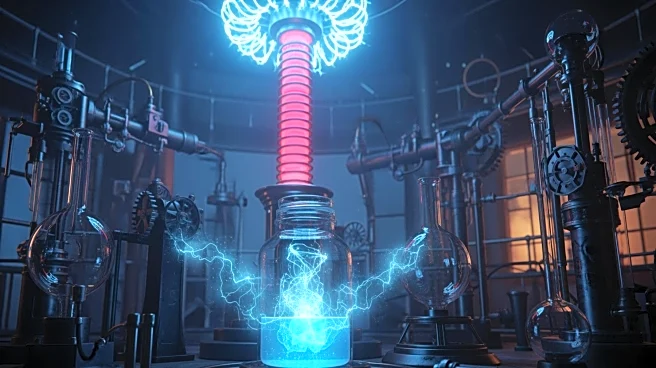What's Happening?
Guillermo del Toro has released the final trailer for his film 'Frankenstein,' which is currently playing in select theaters and will begin streaming on Netflix on November 7. The trailer highlights the intense relationship between Victor Frankenstein, played
by Oscar Isaac, and his creation, portrayed by Jacob Elordi. The Creature confronts Victor, emphasizing that he was created as 'someone,' not 'something,' and pursues him across a frozen tundra. The trailer also features Elizabeth, played by Mia Goth, who taunts Victor about his creation. The film promises to deliver del Toro's signature gory and gorgeous visuals, as it explores themes of creation and consequence.
Why It's Important?
The release of 'Frankenstein' is significant as it showcases Guillermo del Toro's unique cinematic style, which is known for its visual richness and thematic depth. The film's exploration of creation and its consequences resonates with contemporary discussions about scientific ethics and the responsibilities of creators. Del Toro's work often challenges audiences to reflect on the moral implications of innovation, making 'Frankenstein' a culturally relevant piece. Additionally, the film's availability on Netflix expands its reach, allowing a broader audience to engage with its themes and visuals.
What's Next?
As 'Frankenstein' begins streaming on Netflix, it is expected to attract a wide audience, potentially sparking discussions about its themes and visual storytelling. Critics and viewers alike may analyze the film's portrayal of the creator-creation dynamic, contributing to ongoing debates about scientific responsibility. The film's reception could influence future projects by del Toro and other filmmakers, encouraging them to explore similar themes with innovative visual techniques.
Beyond the Headlines
The film's release may also impact the film industry by setting a benchmark for visual storytelling and thematic exploration. Del Toro's approach to 'Frankenstein' could inspire filmmakers to tackle complex narratives with bold visual styles, potentially leading to a shift in how stories are told in cinema. Furthermore, the film's themes may resonate with audiences concerned about the ethical implications of scientific advancements, fostering a deeper cultural dialogue.

















